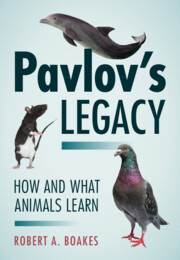Book contents
- Pavlov’s Legacy
- Pavlov’s Legacy
- Copyright page
- Contents
- Preface
- Acknowledgments
- 1 Ivan Pavlov, Conditioned Reflexes and Experimental Neuroses
- 2 Developing Habits
- 3 Learning Where Things Are and Where Events Happen
- 4 Fear, Avoidance, and Punishment
- 5 Comparative Psychology
- 6 Imprinting and Constraints on Learning
- 7 Discrimination Learning, Attention and Stimulus Generalization
- 8 B.F. Skinner and the Experimental Analysis of Behavior
- 9 How Animals Learn to Associate Events
- Notes
- References
- Index
9 - How Animals Learn to Associate Events
Published online by Cambridge University Press: 07 October 2023
- Pavlov’s Legacy
- Pavlov’s Legacy
- Copyright page
- Contents
- Preface
- Acknowledgments
- 1 Ivan Pavlov, Conditioned Reflexes and Experimental Neuroses
- 2 Developing Habits
- 3 Learning Where Things Are and Where Events Happen
- 4 Fear, Avoidance, and Punishment
- 5 Comparative Psychology
- 6 Imprinting and Constraints on Learning
- 7 Discrimination Learning, Attention and Stimulus Generalization
- 8 B.F. Skinner and the Experimental Analysis of Behavior
- 9 How Animals Learn to Associate Events
- Notes
- References
- Index
Summary
This chapter starts by describing key findings from the late 1960s - blocking, contingency effects, and relative cue validity - that were obtained by Leon Kamin, Bob Rescorla, and Allan Wagner from experiments on discrimination learning and fear conditioning. These led to a major shift in the way learning by animals was studied. Instead of concentrating on how their behavior changed, it took such changes as an index of what associations the animals had formed. An important example of this shift was the body of experiments on second-order conditioning and related topics carried out by Rescorla and his students. A number of theories of associative learning that were developed in the 1970s, notably the Rescorla-Wagner theory and Wagners subsequent SOP model, have remained influential for over 50 years. In the early 1980s an important distinction was drawn between actions, which are sensitive to their consequences, and automatic habits.
Keywords
- Type
- Chapter
- Information
- Pavlov's LegacyHow and What Animals Learn, pp. 258 - 302Publisher: Cambridge University PressPrint publication year: 2023



